In 2026, backend frameworks are still the foundation behind almost every app and website we use. Using frameworks is no longer just a trend. According to Statista, more than 70% of developers depend on them to develop a top-notch product faster.
What’s cool is that developers’ favorite technologies are shifting a bit. The 2024 Stack Overflow Developer Survey shows Node.js, Express, and Django are still the most popular frameworks. This means JavaScript and Python are still leading the way in backend coding.
Backend frameworks are changing fast. With the rise of live applications, API-first approaches, and AI features, it is more essential than ever to choose the right one.
So, in this blog, we will discuss the 15 best backend frameworks for web apps in 2026, what they do, and what benefits they provide.
What are Backend Frameworks?
A backend framework is like a set of tools that helps developers build the part of a website or an application that you do not see. It handles things like how data is stored, how users interact with the app, and how different parts of the app communicate with each other.
Instead of developing everything from scratch, developers use these web and mobile app development frameworks to save time and avoid repeating common tasks. It is like using a ready-made structure for a house instead of starting with just the land.
Some very popular backend frameworks include Django for Python, Express for JavaScript, and Ruby on Rails for Ruby. Each one has its own benefits, depending on the type of project you are working on.
Top 15 Most Popular Backend Frameworks of 2026
Alright, now that we’ve got the backend framework basics out of the way, it’s time to figure out which framework makes the most sense for your project in 2026.
Our survey highlighted a few that developers really seem to like, so let’s check them out and see what each one brings.
1. ASP.NET Core
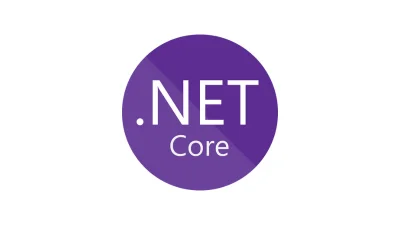
ASP.NET Core, which is built by Microsoft, is one of the best backend frameworks that is popular right now among developers. It is one of the best choices if you are looking to develop fast and reliable web apps. ASP.NET Core backend framework works on different systems.
For example, Windows, Linux, and macOS, so you are not locked into one platform. Also, this backend development framework connects smoothly with Microsoft’s Azure cloud services and has a bunch of useful tools and libraries. This makes it the best option for web developers working on serious and scalable projects.
ASP.NET Core Benefits :
- Cross-platform support
- High performance
- Seamless Azure integration
- Open-source and actively maintained
- Rich ecosystem
For Example : Dell and GoDaddy.
2. Django
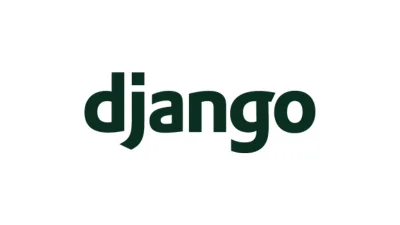
Django is another popular Python framework known for making web development easy. It comes with everything you need, like a database manager, user login features, templates, and more.
This allows you to focus on what makes your app unique, rather than developing basic features from scratch. Django is a great programming language for handling growing projects. This keeps your website secure and helps you develop things fast.
Its main idea is to write clean, reusable code, so you do not repeat yourself. While it can feel a bit rigid for certain types of projects, like microservices or highly customized systems, Django backend development is constantly improving with updates.
It covers better support for asynchronous tasks, improved API tools, and integrations with modern front-end frameworks.
Django Benefits :
- Speeds up web app development
- Handles high traffic with ease
- Protects against common security threats
- Fits both simple and complex projects
- Supports modern web development features
For Example : The Washington Times, Mozilla
3. Laravel
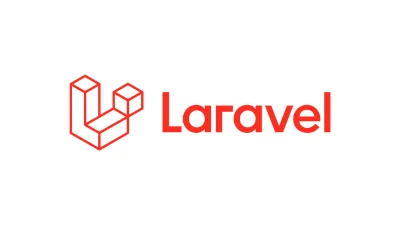
Developing websites with PHP feels fresh again thanks to Laravel. Its clean structure and helpful features take the headache out of coding. It allows you to focus more on your ideas and less on repetitive tasks.
With frameworks that manage routing, authentication, and more out of the box, it speeds up PHP web development without cutting corners. The Eloquent ORM makes working with databases feel intuitive, even for complex queries.
From small projects to full-scale platforms, the Laravel backend framework provides a seamless and efficient way to bring web apps to life. It’s also well-suited for building solutions involving mobile payment technology that help developers create secure and reliable payment systems.
Laravel Benefits :
- Simple and clean coding style
- Fast development with built-in tools
- Active and supportive developer community
- Good structure for organized code
- Regular updates and improvements
For Example : Pfizer and BBC
4. Ruby on Rails
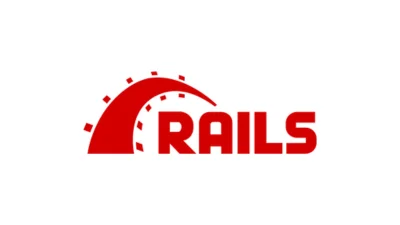
When you build web apps with Ruby on Rails, a lot of the hard work is already done for you. It gives you the basic backend frameworks and setup so you can focus on creating the unique parts of your app without stress.
Rails is especially useful if you are working on mobile app prototyping because it helps you quickly build and test the backend. This means you can bring your ideas to life faster without getting stuck on technical details.
Even though the Ruby on Rails web framework is not one of the most common backend frameworks, Rails stays popular because it is easy to use and helps developers build reliable apps faster.
Ruby on Rails Benefits :
- Simplifies the web app development process
- Provides ready-to-use components and tools
- Speeds up mobile app prototyping backend
- Supports automatic testing to catch errors
- Helps build apps with clean, organized code
For Example : Basecamp and Twitch
5. Express.js
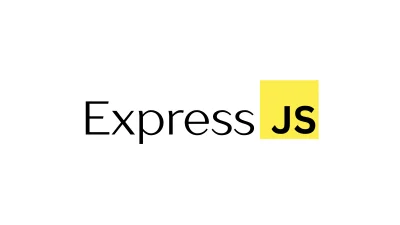
Express.js is a popular choice for developing backend web apps and API development with Node.js. It is lightweight and easy to use, which gives developers just the right tools without extra clutter.
Since it does not force you into any particular way of doing things, you can organize your app however you like. Express.js makes web app development and APIs faster by allowing you to use middleware to manage requests.
It sets up routes for different URLs and works with template engines to show dynamic content on your pages. If you are looking to develop a web application, Express.js for backend development is the right choice for you.
Express.js Benefits :
- Really very easy and simple to learn
- Massive Node.js ecosystem
- Strong community support
- Simplifies server-side JavaScript development
- Good for both small and large projects
For Example : MySpace, PayPal, IBM
6. CakePHP
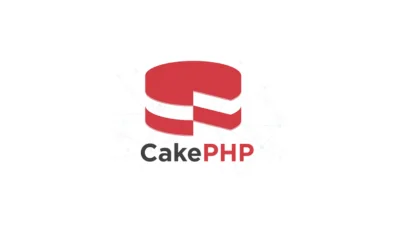
CakePHP is yet another one of the top backend frameworks that help developers develop custom websites. It helps speed up CakePHP web development by giving you a basic structure to start with. This CakePHP backend framework starter code, called a scaffold, saves time and allows you to focus on developing your app’s actual features.
It follows the MVC or model-view-controller pattern, which keeps your code organized and easy to manage. CakePHP is open-source and free to use under the MIT license. This makes it a solid chance for both small and large projects.
CakePHP Benefits :
- Quick setup with code scaffolding
- Follows MVC for clean code structure
- Open-source and free under the MIT license
- Built-in tools for form handling and validation
- Simplifies database interactions
For Example : Maple CRM
7. Flask
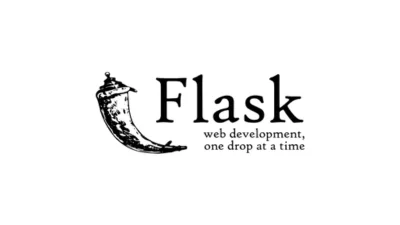
Flask is a lightweight, backend framework that helps with mobile app development by using Python. Instead of running in the browser, it runs on the server side and handles things like requests and responses.
One of the reasons developers like Flask is that it gives them the freedom to build custom projects without unnecessary features getting in the way.
It’s fast, flexible, and easy to extend. You can add extra features using extensions, and they blend in so well that it feels like they’re part of Flask itself.
Flask Benefits :
- Good control over app structure and components
- Works well for quick prototypes and MVPs
- Simple integration with databases and APIs
- Built-in development server and debugger
- Strong community and clear documentation
For Example : Pinterest and Netflix
8. Spring Boot
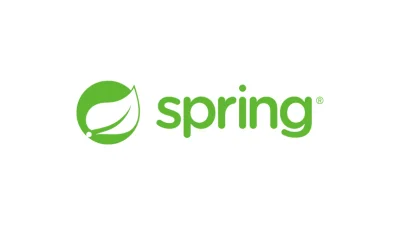
Spring Boot is the best framework for backend development that helps you build Java apps faster without dealing with a lot of setup. It does most of the hard work for you, like setting up the server and connecting things in the background.
You don’t have to write a lot of extra code, nor does it require a full mobile app tech stack. You just focus on what your app needs to do. Spring Boot Java backend framework is great for both small and big projects, and it’s often used to build mobile apps that need to be fast, safe, and easy to grow.
Spring Boot Benefits :
- Built-in tools for security and performance
- Works well with the Spring ecosystem
- Helps build reliable, scalable apps
- Supports quick testing and deployment
- Strong community and plenty of resources
For Example : Amazon, eBay, and Zalando
9. Koa
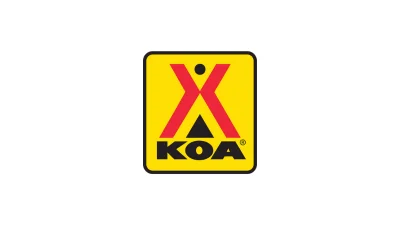
Koa is a lightweight Node.js backend framework made by the team that created Express.js. It uses modern JavaScript features like await to make working with asynchronous code easier and cleaner. Unlike other frameworks, Koa Node.js backend framework doesn’t include any built-in tools or middleware.
This means you get to choose exactly what you want to add. This makes it flexible and simple to create a mobile app wireframe. It’s a good choice if you want full control over your app, especially when building APIs or small services.
Koa Benefits :
- Easy to customize with only the needed tools
- Great for building APIs and microservices
- Improves code readability and structure
- Less overhead, faster performance
- Encourages modular and clean code
For Example : GAPO
10. Phoenix
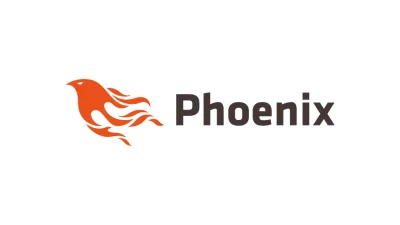
Another one of the leading backend frameworks is Phoenix. It is a tool for making websites using a language called Elixir. It’s really good at handling many users at once without getting slow.
Because of how it’s built, the Phoenix Elixir backend framework works great for apps that need to update things live, like messaging apps or games. It is mainly for web apps, but it works well with Android frameworks when you want your web and mobile apps to communicate with each other smoothly and conveniently.
Phoenix Benefits :
- Handles many users at the same time easily
- Great for real-time apps like chat or games
- Helps build fast and reliable web apps
- Uses a clean and organized code structure
- Built with a language known for speed
For Example : Discord
11. FastAPI
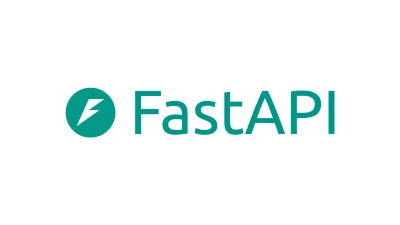
FastAPI is a high-performance web development framework for developing API with Python. This FastAPI Python backend framework is used to develop both websites and mobile apps. Developers love it the most because they can write less code and still get the best results.
Additionally, it checks for errors automatically and assists in keeping everything organized. FastAPI is great for developing modern web services fast. It is especially in cases when speed and simplicity are essential. It is used by many companies today.
FastAPI Benefits :
- Automatic data validation
- Easy to learn and use
- Faster development time
- Strong community support
- Best for developing APIs
For Example : Dispatch
12. ASP.NET
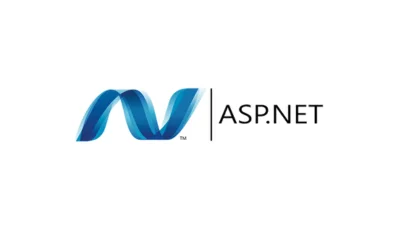
ASP.NET is a web development framework made by Microsoft. It assists you in developing websites, web applications, and online services using languages like C#.
You can think of it as a toolbox for web developers to create visually appealing and scalable web pages. As of 2025, over 2.65 million companies worldwide have adopted ASP.NET as their preferred programming framework.
Additionally, it runs on the .NET platform and handles things like user login, form submission, and database connections. ASP.NET web development framework saves a lot of your time by providing built-in features and allows you to focus more on what your website should do.
ASP.NET Benefits :
- Fast performance with built-in caching
- Secure with built-in authentication and authorization
- Supports multiple programming languages, like C#
- Easy integration with databases
- Easy deployment and hosting
For Example : Amazon and eBay
13. Meteor
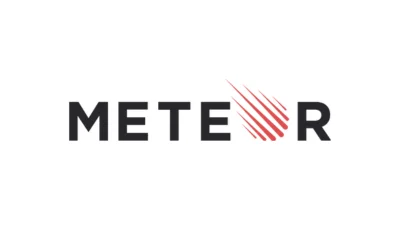
One of the fastest and secure backend frameworks that just helps developers develop web and mobile apps fast. It uses the Node.js framework and allows you to write both frontend and backend code in JavaScript. This makes the developer very easy.
Meteor backend framework comes with built-in tools for real-time updates, so your app can change instantly without refreshing the page. Also, it works well with MongoDB and integrates seamlessly with popular frontend libraries like React.
Meteor Benefits :
- Seamless frontend-backend communication
- Cross-platform development
- Built-in authentication
- Full-stack JavaScript
- Large package ecosystem
For Example : WorkPop and Chaser
14. Svelte
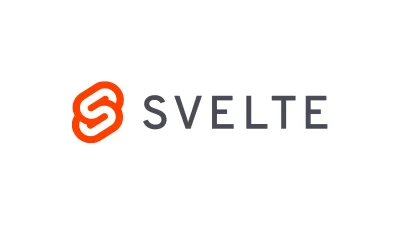
Svelte is a modern JavaScript framework used to build user interfaces. It was introduced in 2016 and stands out from other frameworks. It shifts most of the work to the app development process instead of running everything in the browser.
This means it generates small, efficient code that makes your app load and run faster. Unlike other frameworks, Svelte backend capabilities do not depend on a virtual DOM. Instead, it updates the real DOM directly when something changes in the app. This makes it super fast and efficient.
Svelte Benefits :
- Faster performance
- Smaller bundle size
- No virtual DOM
- Very easy to learn
- Better developer experience
For Example : The New York Times and Rakuten
15. Nest.JS

Last but not least, Nest.js is one of the modern backend frameworks developed on top of Node.js that uses TypeScript by default. It helps developers to build scalable and well-organized server-side applications.
The high-performance backend frameworks are designed around a modular structure. This means your code stays easy to manage as your project grows. It uses decorators like Angular to set up things like routes, services, and modules.
One of the biggest strengths of Nest.js is its built-in systems for dependency injection. This makes managing different parts of your app really simple and makes your code very easy to test.
Nest.js Benefits :
- Easy unit and integration testing
- Works well with databases and ORMs
- Compatible with Express and Fastify
- Active community and strong documentation
- Easy to scale
For Example : Unilever and Adidas
Why Trust Nimble AppGenie For Backend Development?
Each backend framework has its own advantages. But no matter how powerful a framework is, it needs the right custom web development services provider behind it to really deliver results. That’s where the expertise of Nimble Appgenie makes all the difference.
Since 2017, we have been helping businesses build scalable and reliable backend systems. We do not just develop backends. We provide top-notch solutions that work for your business goals.
So, if you are looking to strengthen the core of your application, our dedicated backend developers are here to help you get it right from the ground up. Let’s build something amazing together!
Conclusion
Choosing the right backend framework in 2026 depends on what your project requirements are and what your team is comfortable with. No matter if you want speed, easy coding, or strong security, there is a framework for that.
Each one helps develop the hidden part of your application or website that makes everything work smoothly. Remember, the best backend frameworks for startups are the one that fits your project goals and helps you create fast and top-notch apps and websites.
So, now that you have a whole list of top backend frameworks, choose carefully what works best for you and start creating something amazing.
FAQs

Niketan Sharma, CTO, Nimble AppGenie, is a tech enthusiast with more than a decade of experience in delivering high-value solutions that allow a brand to penetrate the market easily. With a strong hold on mobile app development, he is actively working to help businesses identify the potential of digital transformation by sharing insightful statistics, guides & blogs.
Table of Contents


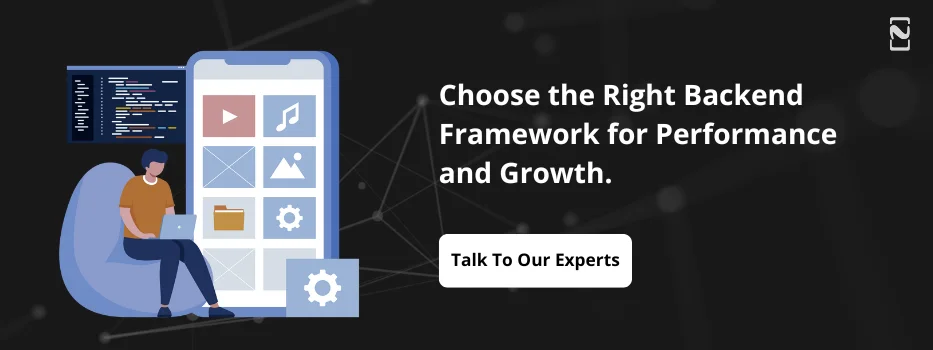
No Comments
Comments are closed.